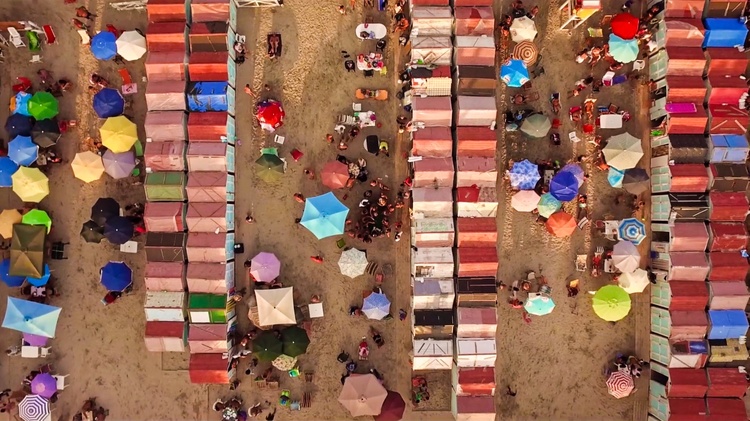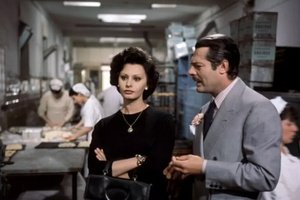The film is a colourful depiction of Italian beach culture set amidst the economic crisis on Palermo’s most touristic coastline, Mondello Beach.
Every summer on Mondello Beach, more than a thousand cabins are erected to house the bathers who will spend the season there.
For these people, the “huts” are the perfect setting in which to hide behind the memory of a social status that the crisis of recent years has undermined.
The film follows various characters as they relish in the joys of living beside the sea, all the while contemplating the various debts and tribulations which continue to creep up on them.
An illegal barman walks the sand selling coca-cola and beer in an attempt to provide for his family.
A mother discusses her inability to economically support the possibility of a second child.
Three middle-aged women sunbathe and gossip while hoping to forget their aging and uncertain futures.
And a newly running politician attempts to convince the other beachgoers that he will be able to render their lifestyles more comfortable.
Sicily was one of the hardest-hit regions economically in Italy.
Its economic output fell by more than 13 per cent between 2008 and 2015, although it is slowly recovering.
The jobless rate remains at 22 per cent, which is twice as bad as the national average.
According to Sicilian director Giovanni Totaro, the crisis struck mostly on the middle class, who are now very mindful about their purchases while attempting to maintain their previous lifestyle.
The cabins represent a kind of willed forgetting and an oasis away from the every day.
“They pay tribute to the villa in Mondello that the families will never afford,” Totaro says.
“Houses are very expensive in Mondello.
“The cabins represent a sort of revenge for a lot of the families who rent them.”
Many middle class families in Sicily have become poor, particularly with the lack of jobs, and almost all of the young people that belong to these families leave Sicily.
“It is no accident that in Happy Winter there are very few young people,” Totaro says.
They have all almost certainly departed for England, Germany, the Netherlands or Australia in search of work.
One of the most notable aspects of the film is the general sense of delusion and disappointment amongst the people toward politicians and politics.
Sicilians no longer trust politicians, perceiving them as largely corrupted and focused on their business gains, Totaro says.
“At the same time, Sicilians are fascinated by powerful men,” he continues.
“They hope to be helped and they envy their position.
“Some politicians, like Matteo Salvini [leader of the far-right political party the League], hold power because they use the immigrant people as a common enemy, feeding a battle of the have-nots.”
Salvini has recently come under fire after closing off all Italian ports to non-Italian vessels.
Although the families wish each other a “happy winter” at the end of the film, it seems that winter will be filled with economic difficulties, stress and concern for the future.
Visually, the film is extremely arresting, particularly in the opening and closing sequences which highlight the colourful umbrellas and aquamarine ocean.
Totaro says the shots were captured with drone.
“I wanted to use the drone in a spectacular way, to show the beach, my stage, and connect it as a local place with the universal.
“The stories told here hold a strong connection to place, and are expressed by people with a sense of humor, who are willing to put themselves out there.
“I know that the public will empathize with my characters,” he affirms.
Happy Winter will screen as part of the eighth edition of Australia’s international documentary film festival, Antenna, which takes place annually in October across six intensive days.
Totaro is a guest of the festival and will take part in Q&As after the screenings, supported by the Istituto Italiano di Cultura.
You can purchase your tickets here.















